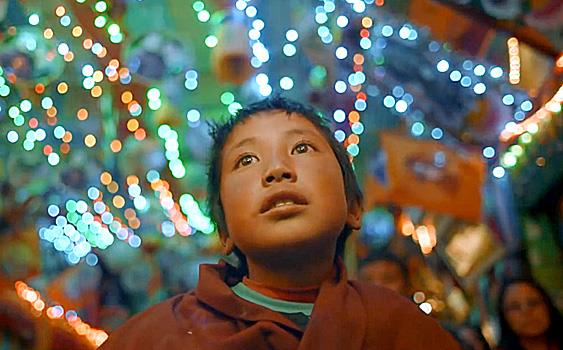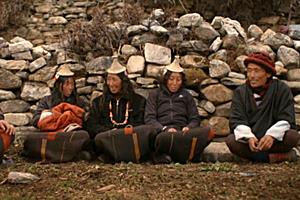
Snobs who look down on television ought to see it through the eyes of those who have never had it and yearn to see it. Happiness is an objective film about TV and technology coming to remote areas of Bhutan, showing us what it’s like to see it for the first time, and desiring it well before it arrives. The documentary doesn’t hold the device as a cultural advance, nor does it skip the idea of the vast wasteland to be found once you’ve sat down in front of one.
Bhutan's been noted as one of the "happiest" countries in a number of surveys and the film, premiering Monday on PBS' Independent Lens, 10 p.m. ET, makes a study of the existential gap between the simple farm life and the natural curiosity for the outer world as found on the Internet and the ultimate prize for local villagers – a television.
The subject here of filmmaker Thomas Balmès (Bosnia Hotel, Babies) is a nine-year-old monk, Peyangki (top photo), who gets sent off to the local monastery when his father dies and his mother has to work all day spinning cotton by hand. The monastery is more a local schoolhouse and Peyangki's a kid like all others, preferring to cut away and play with his friends rather than study his religious lessons.
There is one telling moment where he buries his head in his lesson cards maybe wishing they could just get implanted directly into his brain without all the memorization and repetition. Part of the kid's story is his mother and uncle's pursuit of a new television, as electricity will soon arrive to the village.
 The Bhutan government approved the deployment of TV and the Internet in 1999 saying the technology could contribute to the “gross national happiness." So, much of Happiness is about witnessing the arrival of electricity and technology to this little remnant of the old world. The rarified mountain village, Laya (right), seems noble and unsullied with many residents in traditional dress living off the land – and may just seem equally isolated and dull to the locals that know there’s a big world beyond the yak herds they tend.
The Bhutan government approved the deployment of TV and the Internet in 1999 saying the technology could contribute to the “gross national happiness." So, much of Happiness is about witnessing the arrival of electricity and technology to this little remnant of the old world. The rarified mountain village, Laya (right), seems noble and unsullied with many residents in traditional dress living off the land – and may just seem equally isolated and dull to the locals that know there’s a big world beyond the yak herds they tend.
The new colliding with the old is most poignant when Peyangki and his uncle travel to the capital city, Thimphu, to buy the TV his mother wants, and to find his older sister who has moved there to find work. He does locate her, although it's not where he expects. It's another awkward step into modernism for the boy as he gets awakened to the world outside his village.
Be aware that Happiness, by its design, demands patience. It's cinéma vérité, without narration and entirely subtitled. Like the vast, almost lunar landscape of its location, it has long, enormous spaces, with quietude as immense as the surrounding Himalayas. It's much in the style of 2003's The Story of the Weeping Camel, which was shot in empty, unpopulated Mongolia with likewise evocative, if not as tender, rewards.
We won't spoil what the family first sits down to gaze at in front of the flickering TV by the end of Happiness – it's obviously not Masterpiece Theatre. But that is likely the point. We’re maybe watching ourselves sixty years ago and now it seems easy to judge once you've had a bite of the technological apple.
But if you've never tasted one, even if you're a Buddhist, it's all you desire.